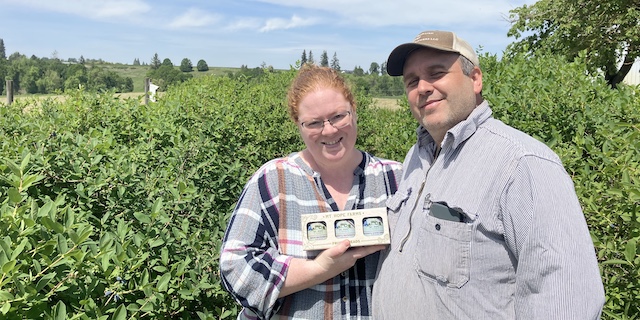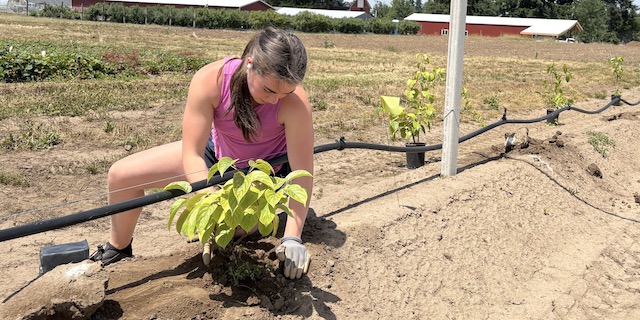Value-added fruit spreads maximize family’s farm acreage
Published 12:44 pm Wednesday, May 14, 2025

- Mike and Laura Ellis, founders of the Mt. Hope Farms fruit spread company, stand among haskap berry bushes planted on their family’s property near Molalla, Ore. (Mateusz Perkowski/ Capital Press)
In blending various flavors to make fruit spreads, Mt. Hope Farms knows there’s a fine line between a recipe for success and a recipe for disaster.
For example, the company treads carefully in mixing lavender with berries and other spices for several of its products.
“The lavender is tough, because if you use too much, it tastes like soap, but if you don’t use enough, you can’t taste it,” said Laura Ellis, who started the value-added operation with her husband, Mike, at the family’s fifth-generation farm near Molalla, Ore.
Taking a risk on such combinations is worthwhile, however, as it helps the small fruit processor stand out in a crowded field — while also introducing customers to ingredients with which they might be unfamiliar, such as aronia berry.
Though aronia berries are chock-full of healthful antioxidants, their taste can be perceived as too astringent, which is why Mt. Hope Farms mixes them with blackberries.
“If we can’t get people to eat it, we’re not going to be able to sell it,” Laura Ellis said.
The company specializes in “fruit spreads,” which contain less sugar than jams and jellies per federal regulations, and are more “fruit forward,” or “not hiding behind a bunch of sugar,” said Mike Ellis.
The couple started Mt. Hope Farms in 2012 upon returning to work on Mike’s family’s grass seed, radish seed and red clover operation, with the idea of marketing products directly to consumers.
“We thought the best way to try to test the market was to go out to the public and try selling stuff,” Laura Ellis said.
The goal was to earn more revenue on land owned by the family, since the large acreage involved in producing seed crops often necessitates renting ground, which isn’t as dependable in the long-term, Mike Ellis said.
When landlords change due to family succession or property transactions, parcels that had taken a long time to perfect can suddenly become unavailable, he said.
Meanwhile, a vertically integrated business that’s focused on growing and selling high-value crops can more effectively use a smaller number of acres.
“Moving forward, the value-added is going to be more of the mainstay of the farm,” Mike said.
At first, the couple experimented with the “community supported agriculture” model, under which customers buy shares of a farm’s seasonal production.
However, they found the market for vegetable CSAs was quite saturated and raising livestock and selling meat through such channels was too labor intensive for a family with two young sons.
Manufacturing and marketing fruit spreads, on the other hand, proved to be more manageable, Laura said. “We really worked to develop recipes while the children were sleeping or napping.”
Initially, Mt. Hope Farms primarily did business at farmer’s markets, where the couple could test out the popularity of new concoctions, but that became too burdensome during Laura’s difficult second pregnancy.
Fortunately, a representative of a specialty grocery chain discovered the company’s products and asked to stock its fruit spreads, which led the couple to develop additional wholesale accounts. Today, fruit spreads from Mt. Hope Farms are featured at about 150 specialty stores.
“That’s the direction we’ve been going ever since,” Laura said.
Selling through such retail outlets involves a steep learning curve, both in terms of following labeling regulations as well as finding the right fit for the products, she said.
Mt. Hope Farms works with higher-end retailers and often positions its products next to the cheese aisle, which tends to attract a sophisticated clientele.
“It’s OK to charge the price you have to charge, it’s just a matter of placing it and marketing it,” Laura said.
Many of the same grocery stores that buy Mt. Hope Farms fruit spreads also purchase fresh-market grapes from the couple, Mike said. “One can often open the door to the other.”
Grapes, aronia, haskap and other fruits used in the company’s products are grown on the family farm, while others are produced by neighboring growers.
Distributing fresh-market grapes to grocery stores adds another time-consuming task to the couple’s already packed schedule, but Mike said it’s a critical way to solicit feedback about quality and sales — and ensures the fruit is stored and displayed properly.
“Since I’m doing deliveries, I’m checking every produce department. That’s invaluable,” he said. “If there’s an issue, I want to know about it.”
Looking to the future, the couple intends to keep expanding Mt. Hope Farms, but remains mindful of overreaching.
“We’re very cautious people. We don’t like to go into anything with a lot of debt,” Laura said.
Though Mike remains involved in his family’s seed-growing operations, the fruit processing venture was established as a separate company to shield the overall enterprise from potential liability.
“We didn’t want to risk wiping out what my dad had built, what my grandpa had built,” he said.
The farm may eventually grow more of the fruit that’s currently supplied by neighboring growers, but only once it’s clear that Mt. Hope Farms has the demand to support additional planting, Mike said.
Within the next few years, the company also plans to build a commercial kitchen on-site, so the couple does not have to continue relying on its current facility in Portland.
Not lugging crops and products back and forth will save time and allow the couple to potentially experiment with new products, such as vinegar, Mike said.
“That’s going to be a real linchpin for us,” he said. “We won’t have to pay rent while we work through what we have to work through.”






